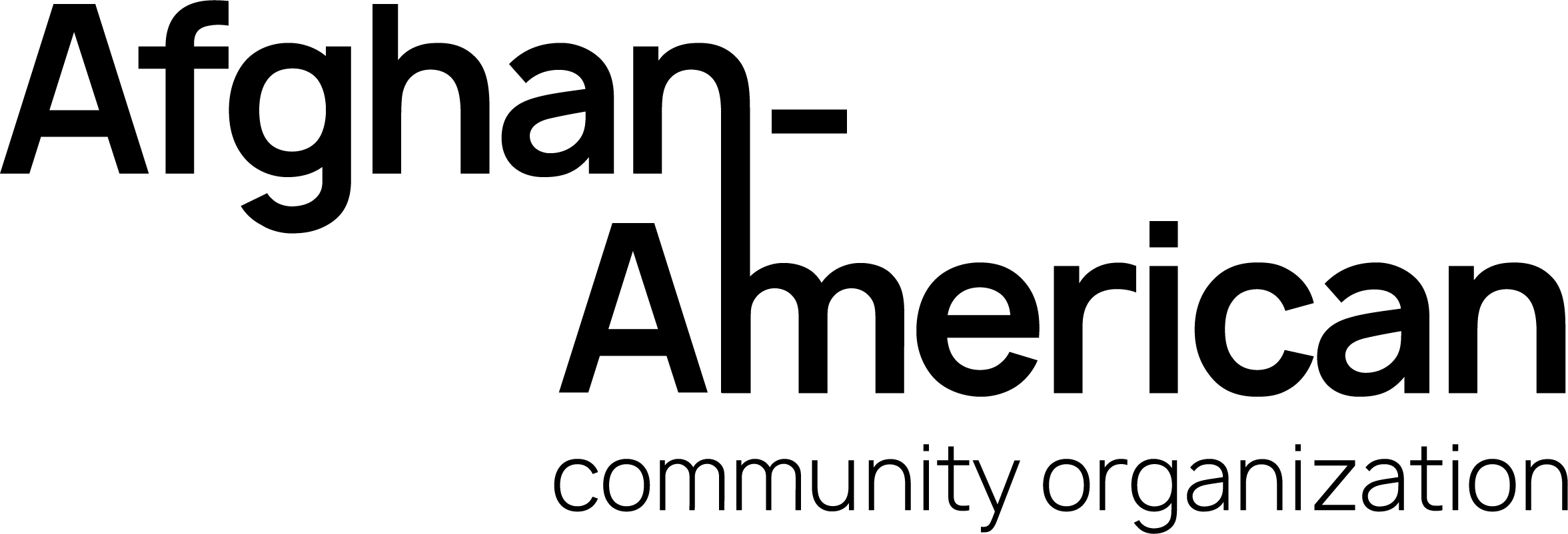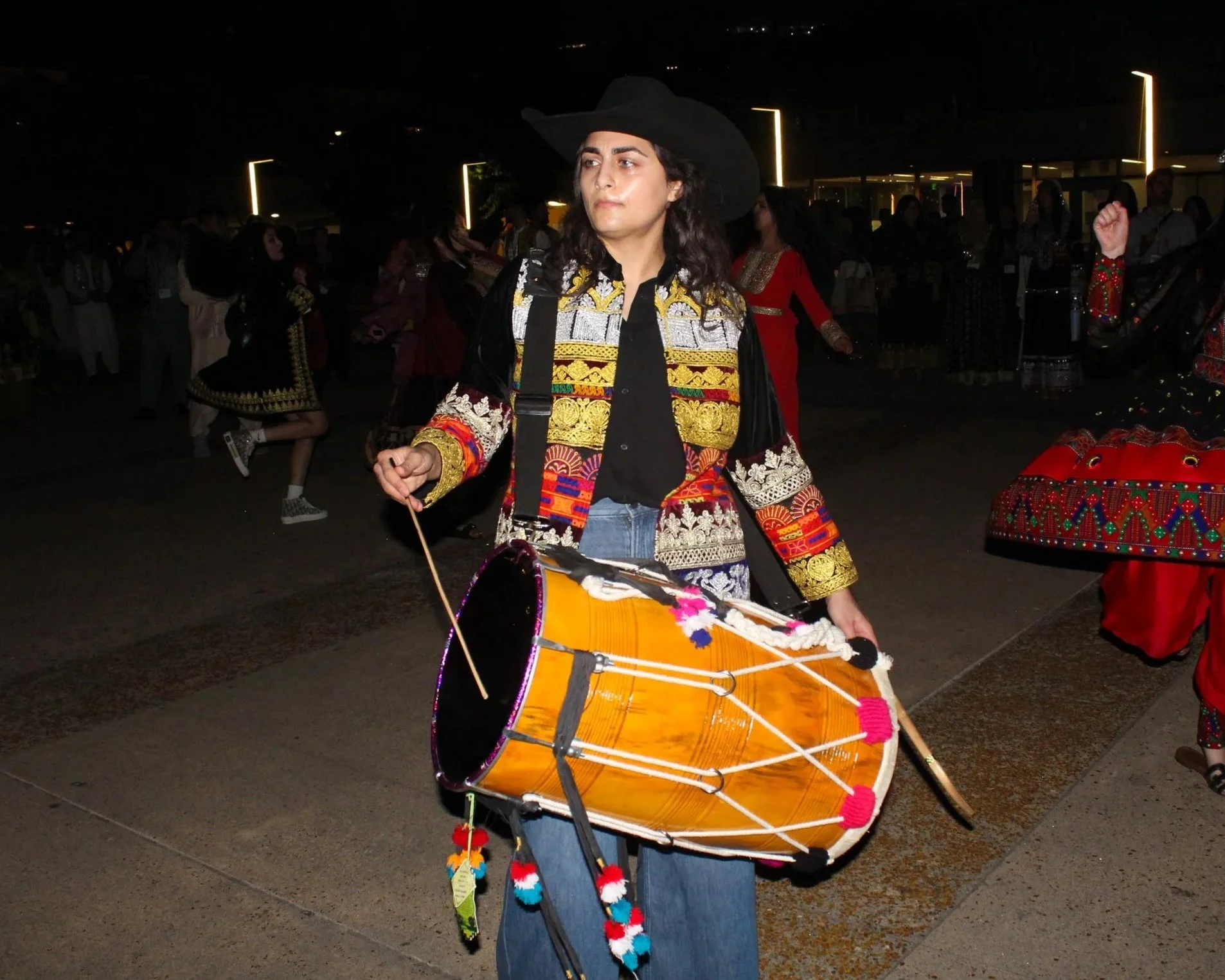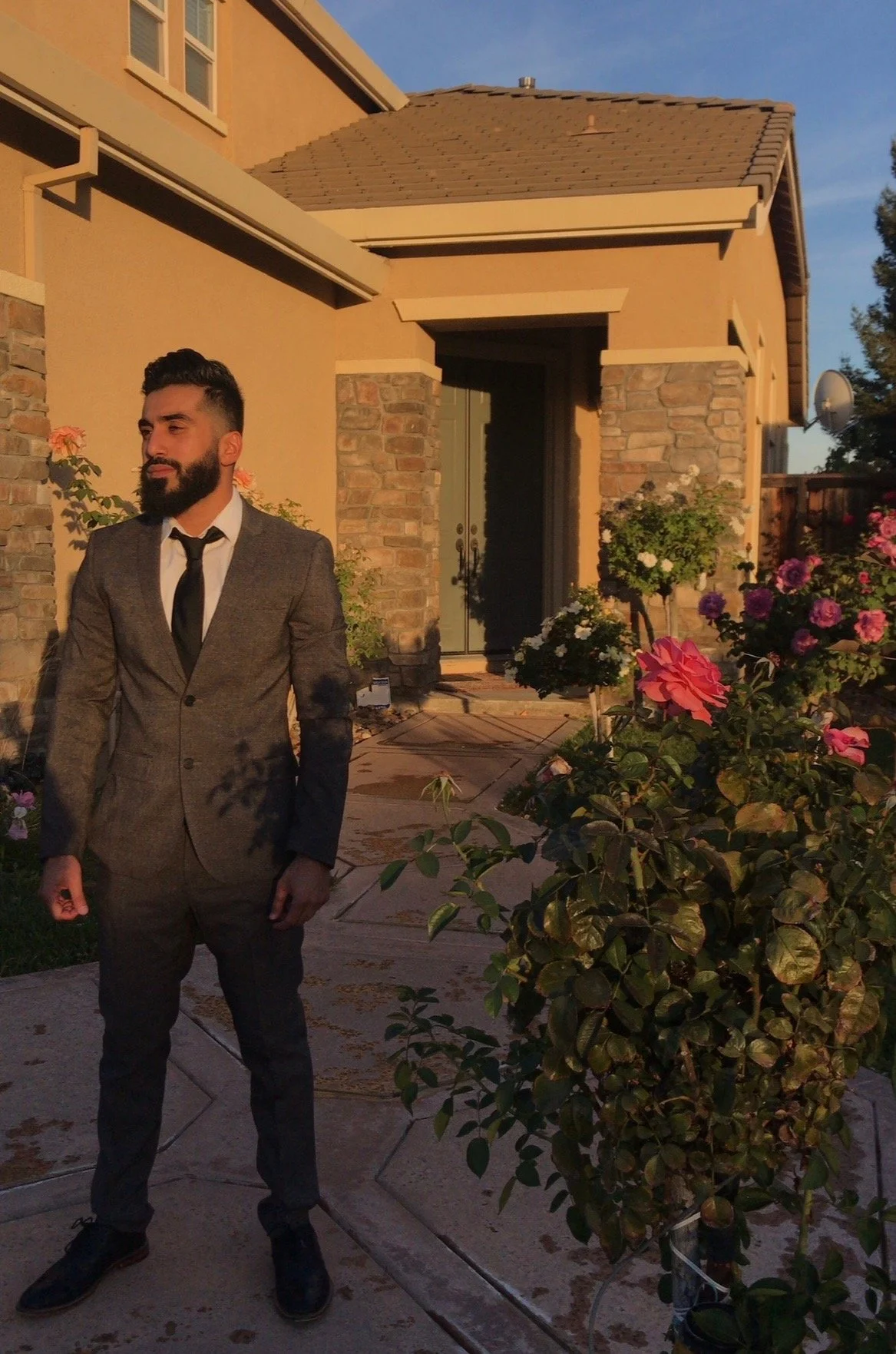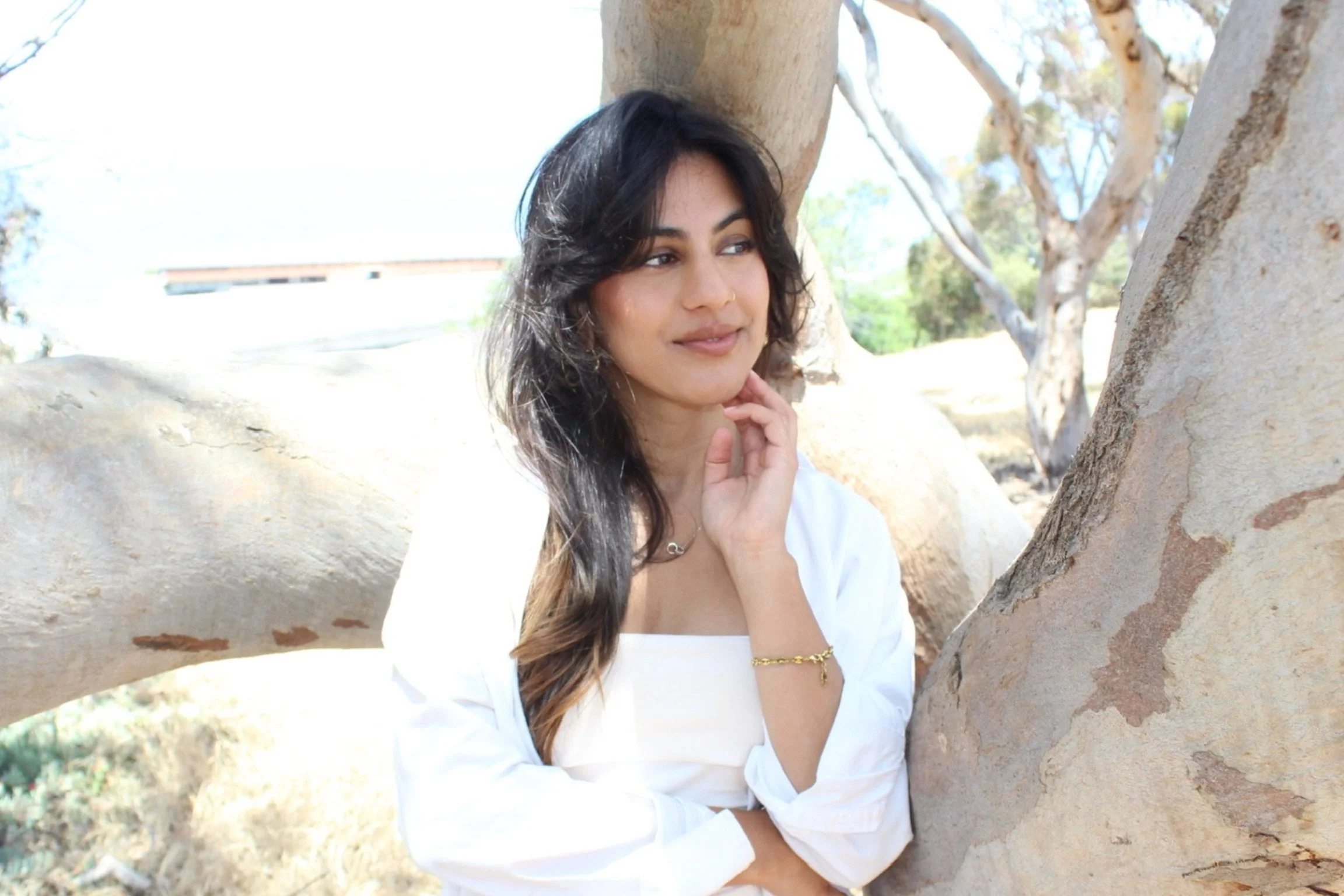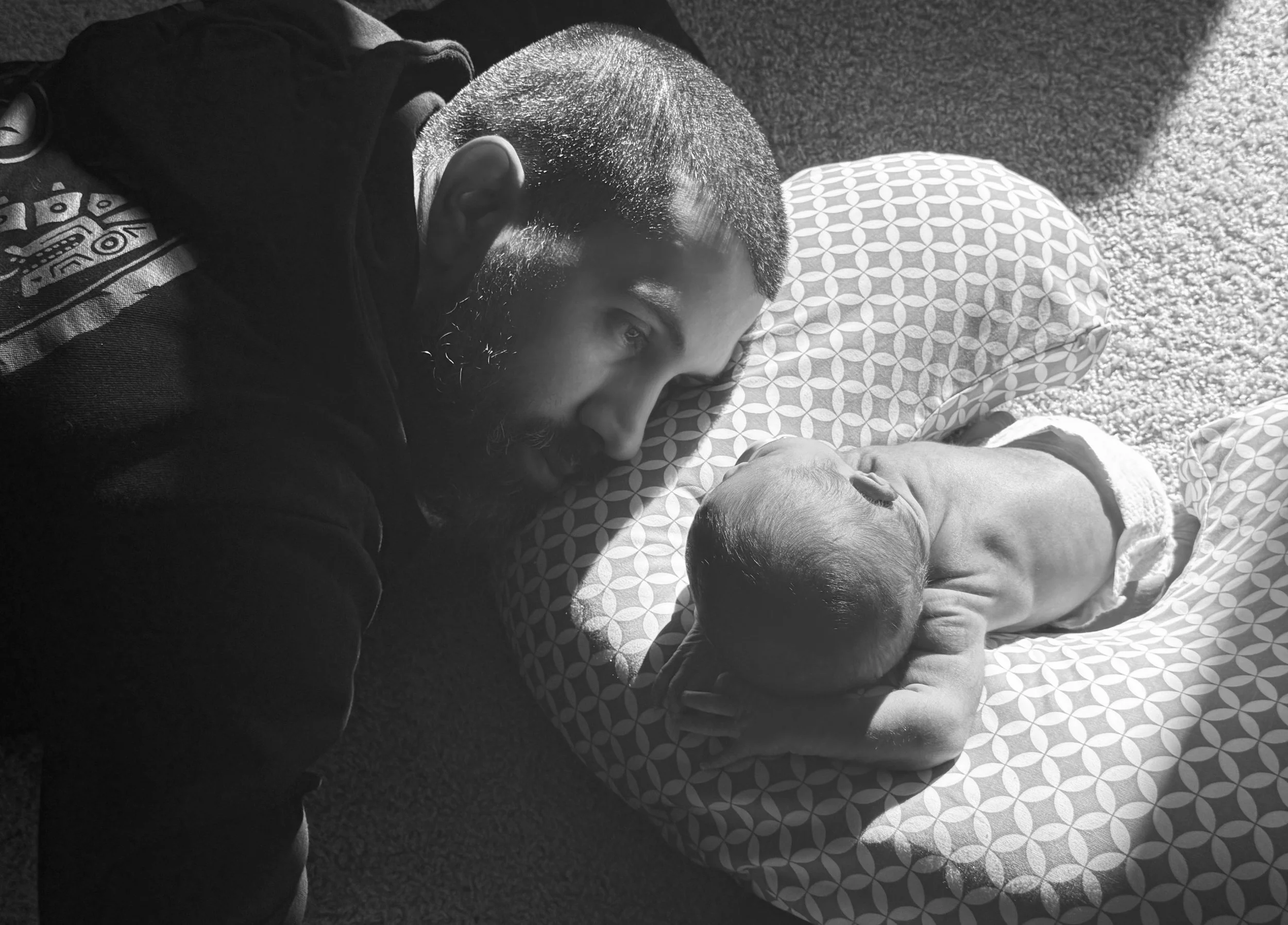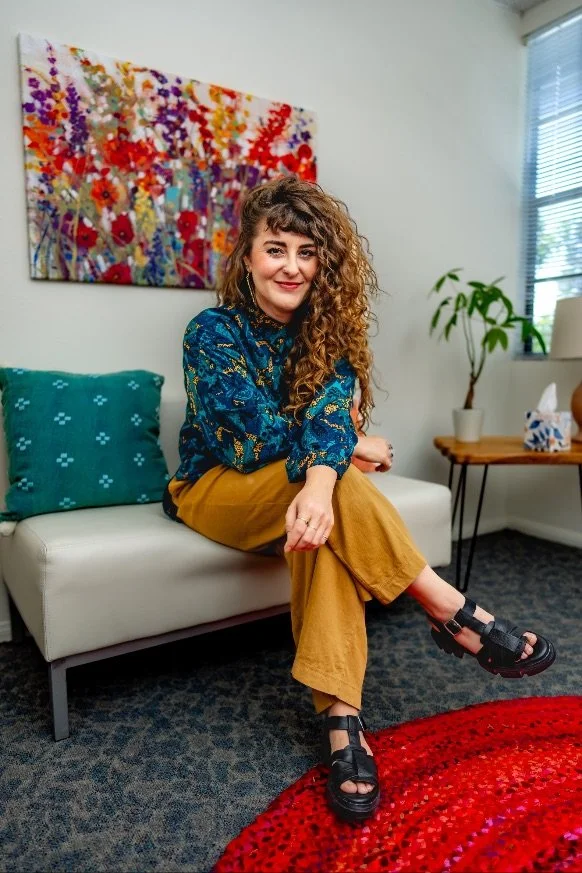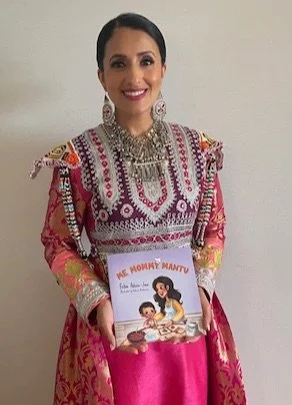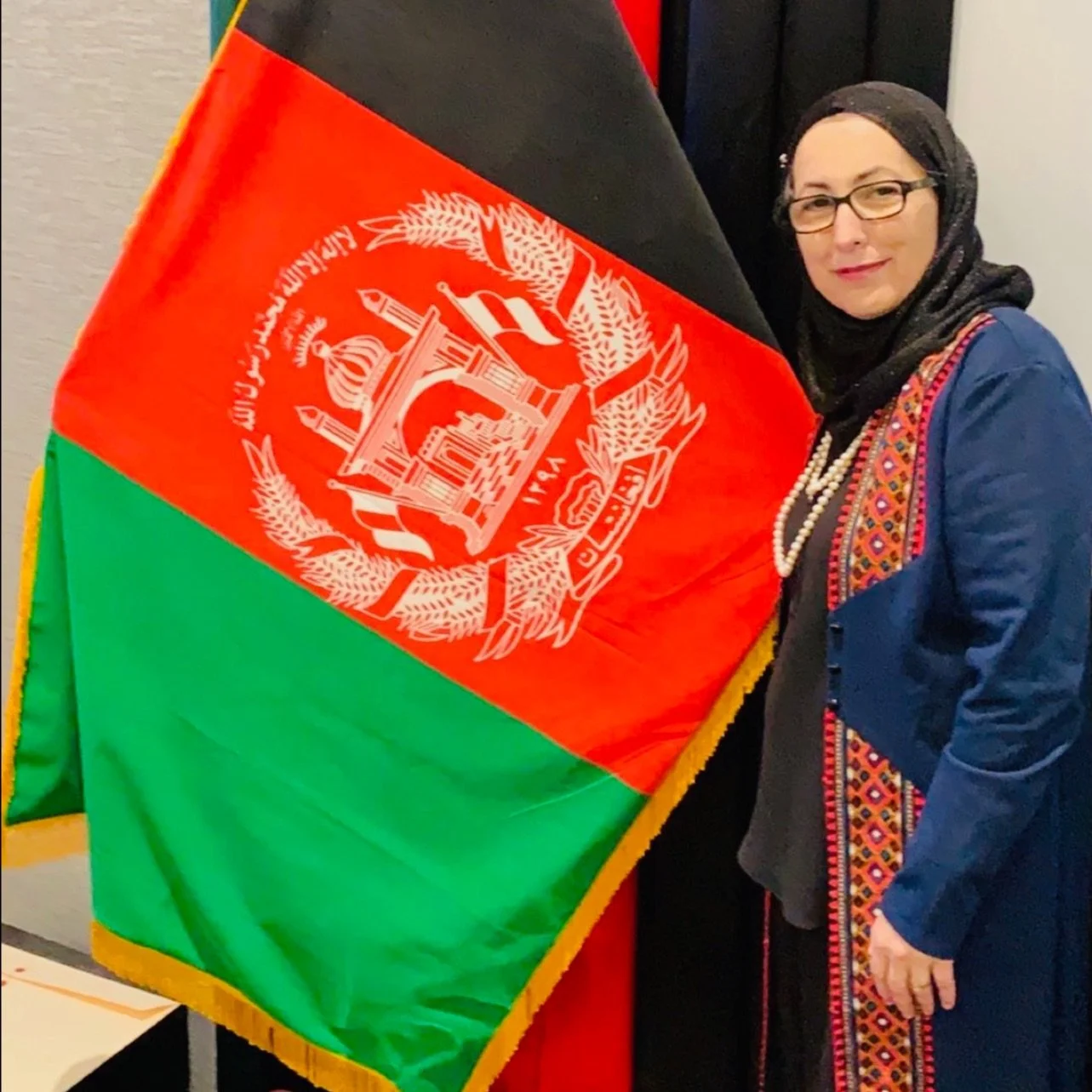BEYOND THE HYPHEN
Help us recognize and celebrate the remarkable individuals and businesses making a positive impact in our community. No, they don't need to be Afghan! We are looking to spotlight all individuals and businesses that empower the Afghan-American community.
Whether you are nominating yourself or someone else, your submission will help shine a light on contributions that foster growth, unity, and excellence within the Afghan-American community.
NOVEMBER 2025 SPOTLIGHT FEATURE
Mina Jahan
I was culture-starved for most of my life. I grew up always feeling like the only Afghan in the room, the only Muslim, sometimes even the only Pashto speaker among Dari speakers. Further, growing up in a post-9/11 world, I found myself suppressing my Afghan heritage, trading authenticity for ease and safety.
In 2017, at my grandmother’s funeral and later at my sister’s wedding, the Houston Afghan community mobilized to support us. This changed something in me. Whether to mourn or to celebrate, I witnessed how our culture and customs are so cool! At 22, with this renewed appreciation for my heritage, I looked for any reason to be around my people. If someone said there was a graduation, a park mela, a wedding for someone I barely knew, I was like, “I’m there!” I sought opportunities to be around the language, the music, the food, the hospitality, the humor, all of it!
While this “cultural renaissance” was taking place, I started my vocation as a pediatric intensive care nurse, a world where compassion, clarity, and advocacy are non-negotiable. In this job, I care for children and support their families through some of the hardest moments of their lives. Working within Houston, one of the most diverse cities in the country, I meet people from every walk of life, with different languages, faiths, and backgrounds. Whenever I encounter patients (and their families) who don’t speak English, I am reminded of my parents and community members who once had to navigate a new country and culture. These moments push me to bring equity and empathy to those who don’t have the language or tools to fully advocate for themselves.
My involvement with AACO happened by chance. One day I was scrolling Instagram and came across the Afghan American Organization. I remember thinking, “How did I not know this existed?” I desperately wanted to attend their annual conference, but of course, we were in lockdown. Shortly thereafter, the Taliban took over Afghanistan. Watching it unfold from afar was gutting. More than ever, I craved community. I wanted to be around people who understood that kind of sorrow.
So I waited. As soon as applications opened again for the conference, I eagerly applied. When I finally went in 2022, it was the first time in my life I thought, Oh. I am with MY people.
Within the conference, I didn’t have to explain myself. I didn’t have to choose between being Afghan or American. I could just be Afghan American, which I now understand is its own culture entirely. The music we listen to — Samir Roashan, Habib Qaderi — that’s Afghan American music. Our humor? Afghan American humor. We’re taking the best parts of both worlds and creating something new and beautiful. Being in that space gave me confidence. It made me feel seen. That’s why I come back every year. At first I came to receive; now I come to give.
The conference provides me with cultural pride and nourishing friendships. It’s where I met Zaynab and Sahra Ahmad, and the three of us went on to co-found Attanistan. Attan is my Roman Empire. It is my passion and my hyperfixation. What amazes me about Attan is how dynamic it is. No live Attan is ever the same; the rhythm shifts with the leader’s movements, and each performing group has its own energy. Without prior choreography, I marvel at how an improvised Attan displays how our community can move together in coordination, creating a beautiful rainbow vortex.
By combining my love for teaching, the dance itself, and community, we created an organization dedicated to preserving Afghanistan’s national dance.
A lot of folks learn Attan the night before a wedding or engagement party, and it’s high stakes and high stress! We wanted to cultivate the opposite kind of environment. An Afghan dance class that feels like Zumba. We’re laughing, learning, making mistakes, not taking ourselves so seriously, hearing the traditional instruments/music, and meeting other Afghans within our community.
One of my most meaningful memories was when we partnered with YMCA International to host a class for Houston’s newly arrived Afghan refugee girls. These girls had just come to the U.S. within the last few months. I’d been informed that they had low morale due to culture shock. I instructed them, “Wear something comfortable, like gym clothes.” These girls came clad in their nicest Afghan clothes, makeup done, and hair curled. It was as if it were Eid morning! I taught in broken Pashto, and was also assisted by our trusty Pashto and Dari translators. At first, the students were timid and quiet. By the end, however, they were laughing and glowing.
During my classes, I always say that I don’t actually care if you leave my workshop knowing Attan. Truly. What matters to me is that you hear our traditional music and instruments, and that you befriend other Afghans in your community.
So much of what is shown of Afghanistan focuses on pain and destruction. I’m not saying that isn’t real; it absolutely is. But that is not all that we are. We are joyful, hospitable, and resilient. Our culture is vibrant, robust, and alive. Give us a hall and a drum and we will show you! Further, learning and performing the Attan is a form of resistance. I dedicate my classes to those who are not at liberty to play instruments or dance in our Watan. The responsibility lies with the Afghan diaspora to preserve our music and dance.
If I have a message for the Afghan diaspora, it’s this:
Every single one of us has something to offer: a skill, a passion, a certification, or a talent that can support our community. I harnessed my love for Attan to spread Afghan joy, expression, and cultural pride. Whatever your special skill is, whether it’s photography, storytelling, coding, translating, etc… you can use it to uplift the Afghan community, both here and in our Watan!
OCTOBER 2025 SPOTLIGHT FEATURE
Walid:
My journey in service began in high school as an English learner. With family support, I quickly became proficient and excelled in my classes. However, I saw that many of my peers didn’t have the same support. Witnessing this gap motivated me to help others pursue education and a path to college. Having arrived in the U.S. at 12 or 13 with limited resources, I was especially determined to help other Afghans and refugees access opportunities I once lacked.
While at UC Davis, I watched interviews with Afghan girls who had little hope of graduating. Their stories deeply affected me and inspired me to take action. Prompted by my brother’s joke to "start a school," I pitched the idea to a nonprofit, secured their support and funding, and recruited UC Davis fellows willing to wake up at 8 a.m. daily to teach, adjusting for the time difference. We eventually shifted to recruiting local teachers for sustainability. Working with the School of Freedom feels both like a privilege and a calling.
I’m constantly driven by empathy for those denied the chance at education or self-expression. Though I can’t entirely relate as a man, I often picture my mother or cousins facing similar hardships. Our team’s commitment endures despite challenges with Wi-Fi, time zones, funding, and teacher retention. Above all, I see myself as a servant to my community, deeply connected to my roots and committed to ensuring others have the opportunities that changed my life.
Moheb:
Growing up, I wasn’t closely connected to the Afghan community outside my immediate family. Raised in a predominantly white area, I had limited interactions with other Afghans. It wasn’t until I attended UC Davis that I actively sought to reconnect with my heritage. Early on, just after COVID, I met Walid at an Afghan event and we quickly became friends. Through Walid, whose nonprofit was then called the Women’s Education Movement, my involvement deepened. Wanting to give back and find a sense of belonging, I joined him. Together, we grew the organization into the School of Freedom.
Finding daily motivation while managing school, nonprofit responsibilities, and postgrad plans is challenging and often draining. Thankfully, support from Walid and our team helps; when one of us is overwhelmed, the other steps up. We’re so committed that we sometimes call each other at 3 a.m. to coordinate tasks and share the load to avoid burnout.
I see myself as American first, but my Afghan roots are deep. This is my home, and I’m committed to keeping our culture alive while building better opportunities and stronger communities for Afghans, both new arrivals and established families. Our main goal for Afghans in the U.S. is to build opportunities and support so newcomers feel welcomed, not lost and find a welcoming network like AACO and preserve the culture. I hope to ease the learning curve for our parents’ generation and leave a legacy created from our struggles; one my family will be proud of.
School of Freedom:
School of Freedom started as a dream to help Afghan girls access education denied to them. Frustrated by the lack of opportunities in Afghanistan, we also carried hope that our efforts, even from afar, could make a difference. For us, this has never just been a project, it’s personal.
We’ve confronted many obstacles: limited funding, teacher retention, time zone hurdles. Still, these challenges feel small when we see the girls thriving and growing. The knowledge that educated girls will, in turn, educate their families, communities, and even generations to come is what truly fuels our commitment. Unlike a man’s education, a girl’s education has a multiplying effect.
School of Freedom stands for much more than education: it’s about community, cultural pride, and a future of opportunity. We want to build something our families can be proud of. Something our California community and Afghan heritage can rely on while empowering Afghan girls. This is an enduring legacy that’s just beginning.
The ongoing challenge is the Taliban’s opposition to girls’ education, which is a threat to our students’ safety. We keep our work quiet to protect them. Additional difficulties include unstable internet, fundraising, and retaining teachers, many of whom volunteer despite hardship. We address these with teacher support and computer literacy workshops. Time differences and communication barriers add complexity, but the rewards make it worthwhile.
Being in the U.S. lets us be the voice for those in Afghanistan who can’t speak for themselves. This is a calling that we were chosen to begin this journey, nurturing the School of Freedom as it has grown over four or five years, and wanting it to continue thriving.
This school is a profound responsibility. Dropping out would disappoint many who depend on us. That duty and the hope we inspire keep us motivated. We are aware of our opportunities and how they currently may not have that basic choice.
The most rewarding part is seeing our dedication to education reflected in the girls. Their passion for learning and self-improvement is truly inspiring. When teachers and students share videos, poems, or messages that express their happiness, it feels incredibly fulfilling. Even a simple ‘good job’ can bring so much joy. Parents have sent heartfelt videos of gratitude, affirming our program’s impact by giving girls hope and a sense of community. It’s a powerful reminder that the Afghan diaspora has not forgotten them.
SEPTEMBER 2025 SPOTLIGHT FEATURE
“I never thought I would be here. When I look back at the journey, I don’t think it was a path I chose; I think it was a path that chose me.”
Layma Murtaza
I grew up in Fremont, California, in a refugee community. There were so many visible needs, but not enough leadership. As youth, we weren’t given a platform. We didn’t always trust ourselves as young leaders. However, those early years laid the foundation for me. Listening to people’s needs and paying attention to their priorities shaped the way I see leadership. Whether it’s a client, a community, or someone directly impacted, my goal has always been the same: to co-design the direction for positively changing their lives. To create sustainable change.
In 2021, my world flipped upside down. I wanted to do something that mattered, something that gave dignity back to people who had lost so much. Quietly, in the background, I started helping Aseel with grants and proposals. A year later, they asked me to join the board as a member. And then, after a series of turns, including losing my job when aid cuts were announced, I joined Aseel full-time. It wasn’t something I had meticulously planned. The doors kept opening, and I walked through them.
I’ve now been in the humanitarian and development sector for over a decade. This work isn’t easy. You sacrifice a lot: marriage, kids, stability. Moving to different countries. Working in conflict zones. Living through crises. And on top of that, facing criticism, both external and internal, as a single Afghan woman. But despite all of that, I can’t imagine myself in any other sector.
What grounds me is love. I know it sounds cheesy, but it’s true. Love of the journey. Love of God. Love of growth. Love of seeing someone’s life change for the better. Love of seeing a smile on someone’s face or brightening their day. That’s what has kept me here, even when I’ve been exhausted, even when I didn’t know what was next.
I’ve learned over time that you don’t always get to control the outcome. We think we’re going to have a certain life, but God laughs at our plans. All we can do is walk the path laid down by those before us, enjoy the good and the bad, and remember that we only get this one life, this one body, this one chance.
I don’t really consider myself a visionary. I’ve always thought of myself as a worker bee. However, as I’ve grown older, I've come to appreciate the value of experience. I see the bigger picture now. I see how to lead things forward. That kind of confidence didn’t come overnight. It came from throwing myself into uncomfortable spaces: moving to new countries, working in conflict zones, witnessing starvation, navigating boardrooms where I was the youngest, the only woman, or the only Afghan in the room.
At first, those situations terrified me. I used to get so nervous in big meetings. I would second-guess myself, afraid of saying the wrong thing. Now, those fears feel so small compared to the bigger issues I’ve faced. The everyday squabbles don’t rattle me anymore. When you’ve lived through war, hunger, or crisis, you learn to ask: Does this really matter?
That shift from nervousness to clarity came not only through experience, but also through reflection and inner work. Confidence comes not only from doing difficult things, but also from healing, reflection, and learning to trust your own voice. My advice? Be patient with yourself. The nerves, the self-doubt; it’s part of the process. Keep showing up. Keep pushing forward. Don’t be too hard on yourself. Confidence takes time. It comes with experience, with pushing yourself into spaces that are uncomfortable. That's where leadership grows.
Looking ahead, I don’t know exactly where this path will take me. And I’m okay with that. What I do know is that I want to remain in spaces where I can make change, where I can have impact. I believe in Aseel’s mission, in an Afghan-led model of humanitarian aid, in showing the world that dignity and agency belong to our communities.
For me, it always comes back to hope, not the easy, romantic kind, but the gritty hope you cling to when everything around you is falling apart. That’s what keeps me here. That’s what keeps me walking forward.
AUGUST 2025 SPOTLIGHT FEATURE
“Life’s fragments, past and present, interlock to form a mosaic of meaning.”
Dr. Wice Niazi
My journey into psychology came from many layers of my own identity, deep reflection, and a yearning to understand myself. Growing up with a twin brother meant I was in a constant state of observing and being observed. We were raised by the same parents, in the same environment, yet we experienced the world very differently, and that fascinated me.
In many ways, I was a mirror to my brother. That mirror brought with it a deep sense of empathy. We were compared in so many ways, and through that, I began to notice an unresolved silence in my own family experiences. I often found myself asking: Why do I feel such profound emotions? What’s really going on within me?
That questioning revealed something I felt had been missing all along. When I began studying psychology at UC Davis, one professor said something that struck me deeply: “Our past experiences shape who we are.” That idea struck a chord in me because if the past shapes us, then present experiences, especially corrective ones, can help heal us. That insight eventually became the foundation of my doctoral work, where I studied Intergenerational Trauma in Second-Generation Afghan American Men.
That work is personal. In my family, the expectation was clear: become a doctor. My father had been a medical doctor in Afghanistan, but after immigrating to the U.S., he couldn’t practice, a story shared by many. For me, earning the title “Dr. Niazi” was about more than professional success; it felt like restoring something lost in our family story, completing what my father could not.
The loss our parents carry, the grief, pressures, and sacrifices, often show up in ways we don’t name. We feel it in their silences, expectations, and quiet fears. As second-generation Americans, we carry that weight, measuring our worth by titles, salaries, and life paths, while quietly wondering: Am I truly enough?
That’s the kind of trauma I explore in my research: the trauma of invisibility, of performance, of never quite knowing if success can satisfy ancestral grief.
Psychology, to me, is sacred because it creates a container for vulnerability, especially within cultures where emotional openness is discouraged. In Afghan and broader patriarchal communities, men are often taught to suppress emotion, to carry on stoically. But therapy invites the opposite: it offers a space to feel, to speak, and to be fully seen. That kind of space is rare, and that’s why I call it sacred.
I love my research because it mirrors my lived experience. I see myself in the men I work with. That “mirror” I once had with my twin evolved into a deeper way of connecting with others. In helping them find language and liberation, I’ve found my own healing too.
Attending my first Afghan American Conference (AAC) was a transformative milestone. I had heard for years how it uplifts Afghan voices and creates space for conversations our communities rarely have, but experiencing it firsthand was even more powerful. The conference was not just about identity. It was about truth-telling and collective healing.
I served on the CARE Team that weekend, supporting attendees through moments of overwhelm, anxiety, emotional triggers, or simply a need to be grounded. I met people in hallways, on stairwells, and under trees. Sometimes talking, sometimes sitting in shared silence, sometimes guiding breathing or grounding exercises.
What struck me most was the familiarity of their stories. In sessions on grief, generational disconnect, masculinity, identity, and longing, people often spoke truths aloud for the first time. As one person opened up, others nodded, teared up, and exhaled together. There was a collective unburdening; something sacred loosening its grip.
That is the power of AAC: it makes space for long-unspoken stories. As a CARE Team member, I wasn’t just witnessing healing; I was part of it, standing at the intersection of my personal story, my research, and my professional calling.
One moment in particular left a lasting impact. As I supported Afghan men that weekend, both newly arrived and those raised in the U.S., I noticed a painful symmetry. The newly arrived could name their grief: loss, separation, dislocation. Their pain was raw, fresh, and spoken. Afghan American men often carried the same ache, but without words for it: grief inherited, quieter, and more ambiguous. In our newly arrived brothers, I heard the unspoken traumas of our parents’ past. One group mourned what was left behind; the other, what was never fully had. In that mirrored ache, I saw how intergenerational trauma blurs the line between personal and collective suffering, and between spoken and silent sorrow. Trauma does not respect time. It echoes until it is heard, held, and healed.
Near the end of the weekend, someone came to me and asked, “Now that I’ve opened up… what about tomorrow? What about next week?” That question has stayed with me. It gets to the core of what I believe this work is about. Yes, we can experience profound healing in sacred moments, but without continued connection and intentional care, we risk returning to the very silence we’ve worked so hard to break.
This is why spaces like AAC matter. And it’s why, for me, psychology has always been more than theory or treatment. It’s about creating sustainable spaces in therapy, in research, in community, where people are allowed to be their fullest selves. Where vulnerability is honored. Where grief is witnessed. Where healing is not just sparked, but nurtured and carried forward.
JULY 2025 SPOTLIGHT FEATURE
“Resistance is the deepest form of love.”
Samera Yousuf
I’m back at the Afghan-American Conference ten years after helping start it, carrying the memories of that first gathering and a vision for what comes next. I still remember what I wrote after the 2015 conference: Thank you for allowing my hyphenated self to finally understand the concept of Home as more than a physical entity.
Growing up, I was surrounded by most of my cousins, something I’m really grateful for as I always felt like I had community. That helped in never being ashamed of, nor feeling alone in my identity, which unfortunately was not a universal experience for Afghans in post-9/11 America. Like many of us, just by nature of being Afghan-American, I grew up acutely aware of injustices happening in the world, and how privileged I was to not be born in a warzone. My parents get all the credit for shaping and molding me. They’re both very justice-oriented and despite all the hardships thrown their way, even in their lowest of lows, they’re always thinking of others, giving whatever they have to those in need, and always expressing gratitude for what they do have. And I’m so grateful they instilled this in me.
Despite coming from a low-income background, I knowingly pursued the non-lucrative path of international aid, with the conviction that it is my responsibility to give back. Being Afghan-American is a strange place to inhabit, because Afghan and American aren’t just two cultures, they’re two disparate worlds, so completely opposite in almost every way. Riz Ahmed put it best when he poignantly said, “We are the inheritors of the scars of Empire, but also the spoils of Empire”. We’re simultaneously oppressed and complicit in oppression. Yes we’re Afghan, but we are also very much American. And as Americans, economically we’re the top 10% globally, and I never lose sight of that.
In college, I was heavily involved as a student activist for progressive, collectivist organizations, including Students for Justice in Palestine and as President of the Afghan Student Association at UCSD. For ASA, we organized big fundraising banquets every year to raise money for humanitarian aid in Afghanistan with the sister UC campuses. These conversations were the precursor to what eventually became AAC.
The magic of the first conference was in its uncertainty. Nobody really knew what to expect, including us, the founding committee. I don’t think we even made the agenda public until maybe a week before. It’s still hard planning it now, but back then, we didn’t have a database of facilitators and past attendees to pull from. We were cold-calling people; just finding them, calling them, sharing our vision with them, asking them to come. And they did. People applied, paid to attend, and traveled from all over the country. That by itself was incredible: knowing they trusted our vision…because it was also theirs.
Coming back a decade later was never the plan. It sort of all fell together quite magically. Throughout the years, people have asked me, Are you going to go back? and I’ve always said, Only if it makes sense. I’m not someone who does things just for the sake of it and if I don’t feel I can add value, I respectfully step aside. I think I was needed that first year to help start it, but after that, I felt more than assured and confident that it was in great hands. I couldn’t be happier with what it’s blossomed into: the largest, active community organization for Afghans in the US. And every single one of us has played a part. Drop by drop, a river has been formed. This Organization is all of ours. Every single one of us has played an integral role into making it what it is today.
Last year, I was at a really low point in my life. Like a lot of us have been after 2021 and the withdrawal from Afghanistan, then 2023 and the genocide against Palestinians. When I went back to AAC last year, I was overcome with emotion. It felt like a big hug, like I was being held. Seeing a sea of Afghan-Americans taking over my alma mater, I felt overwhelmingly proud. Proud of myself, my co-founders I started this with, and every single individual who has since contributed to maintaining and sustaining this sacred space over the last decade. Proud of what we’ve all accomplished and how far we’ve come, together. To be able to continue to rise and move forward, we have to honor our past to build a better future. This year, I’m looking forward to celebrating our communities’ accomplishments over the past ten years.
We carry so much collective grief, stemming from love. If we can channel that into working toward a shared purpose, a supportive, empowered, and engaged diaspora, we’ll advance so much more quickly in achieving our goals. Ten years ago, we didn’t have this. Had we assumed it was impossible, it wouldn’t exist today. You have to radically imagine and be delusionally hopeful to manifest the things you want to exist. Never diminish what you bring to the table because everyone brings something. Find your value-add, and exercise it.
My message for anyone reading this: Love is what brings us together; love for our family, community, culture, homeland. Love is powerful. To resist injustice, you need power. You also need numbers. This is why resistance is the deepest form of love: it requires the collective to love not just themselves, but others, everyone. Keep dreaming, keep building, and never give into despair, because as Baldwin said, we cannot afford it.
JUNE 2025 SPOTLIGHT FEATURE
“Fatherhood doesn’t suck. It’s actually the most difficult but the most rewarding thing in the world. But people who say they love every minute of it? They’re lying. And you can put that in the interview.”
Fahim Sultani
I was born and raised in Phoenix. I also went to school here, built a life here. I’m the youngest of six kids, and like most of us who grew up in immigrant households, I had very Afghan parents.
We didn’t grow up with much. Poverty might not be the right word, but we definitely weren’t well off. My parents were always pushing education and that it was the only path they really knew to a better life. That’s probably the old-school Afghan mentality, right? Do well in school, become a doctor, and make your family proud.
But looking back, I think what really shaped me wasn’t just their expectations, it was the grind. We didn’t have a lot, so we learned early how to work hard. Discipline wasn’t optional. That mentality stuck with me.
Of course, growing up in a big family like mine, it wasn’t just my parents raising me. My older brothers played a huge role in who I became. Honestly, I was more afraid of them than I ever was of my parents. My parents were hard on them, so they were hard on me. But in a weird way, that became love. Now that I’m an adult, those same brothers have become some of my closest friends. They’re still role models.
My relationship with my dad has always been fine. We don’t talk about personal things, but he always showed up for us, and still does. That matters.
Before I even became a dad, I knew I wanted to show up differently. I wanted to be emotionally present, not just physically there.
That little potato of a human changes everything. Honestly, it’s super cliché, but it’s all true. The first month? Brutal. He cried nonstop. I remember thinking, “This sucks.” Anyone who says they love being a father right away is lying. There’s nothing enjoyable at first; it’s like studying for an exam. It sucks, but the reward comes later.
But then you realize: you love them so much, in a way you’ve never felt before. And suddenly, everything our parents did for us starts to make sense. I’d never tell them this, but… they were right about everything. You just don’t get it until you’re a parent.
There are two moments I’ll never forget: the first time I held him in the hospital, and my first, "oh shit" moment. My wife wasn’t doing great, I hadn’t slept in two days, and suddenly I was juggling a crying baby, a dirty diaper, and managed to fling poop onto the wall. Literally. It just smeared down, and I remember thinking: What is happening right now? That’s when it really hit me; this was real.
Fatherhood has changed everything about my life. My priorities. My values. Even my professional goals. I want him to be better off than we were. That’s the whole point.
I don’t have a dream for him.
That probably sounds strange coming from a parent, but I don’t need him to become a doctor or a lawyer or follow some predetermined path. He just can’t be average, that’s the only rule. Whatever he chooses to do, he needs to try to be great at it. One non-negotiable: he’s going to school. Unless he’s a multimillionaire by 18, he’s getting that degree, no excuses.
What I really want is for him to grow past the pressure to care what others think. I want him to do what feels right, not what just keeps up a good image.
I don’t think he’ll go through exactly what I did growing up as an Afghan American, especially post-9/11, but I know he’ll still have moments where he feels different. Where he realizes he’s not the majority in the room. That comes with the territory of being a minority here. I just hope he never feels like he has to shrink himself because of it.
I don’t need him to carry a legacy. I just want him to feel supported. I want him to know he can come to me with anything, and I’ll always be there. I want him to look back one day and say, Yeah, my dad showed up. I hope he carries forward the sense that family is everything. That’s where the real, unconditional love is. The love you don’t have to earn.
I want him to know, I love him. Even when he cried for 12 hours straight. Even when we were sleep-deprived and frustrated and just trying to get through the night. All it takes is one laugh, one cuddle, and everything bad goes away.
MAY 2025 SPOTLIGHT FEATURE
“Don’t let the trauma win.”
Dr. Chelze Zamani
I grew up hearing that school and career were everything. My parents both worked in businesses and I thought I’d end up in Human Resources. But when I started talking to people in that field, I realized, I’m not built for the facade of corporate America. It just didn’t align with who I am. As the eldest daughter of a child refugee, I spent so much of my life following the rules, doing what would make my parents proud. But deep down, I knew I needed to carve a different path; one that let me turn my pain into purpose.
My family lost so much due to war and displacement. I carried a lot of that weight in silence. We’re told to keep things within the family, and for a long time, I did. But I remember thinking, I never want anyone to feel as alone in their suffering as I did. Eventually, I started hearing from people that my presence helped them and that’s when I knew. This was my calling. I wanted to be someone who truly sees others. So I became a Marriage and Family Therapist.
During the pandemic, I was finishing my doctorate and studying for licensure — while also figuring out how to survive. That’s when I founded Forever Caring Mental Health. I thought I’d wait until I had gray hair to open a private practice, but life pushed me. I realized: if I feel this alone, others must too. I wanted to create a space for people like me, people living at the intersection of being mixed, Afghan, and navigating life in the U.S. People who have buried parts of themselves to survive.
In my practice, I tell clients: Bring all your parts in. Especially the ones that were shamed or hidden. I know what it’s like to not belong. As a queer, mixed Afghan, I’ve lived it. I center authenticity, inclusion, and healing because I never saw those things modeled growing up. We weren’t allowed to speak openly, or show the messy parts. I want to shift that.
There’s so much stigma in our community around mental health. I’ve seen how displacement wounds us. We cling to what we know because it feels safer than change. But that mindset, the need to be right, to shut down vulnerability, keeps us isolated. I’ve done that too. It took me years to realize that my own need to be right was rooted in a longing to feel worthy. What I’ve learned is this: healing starts when we let go of survival mode.
My vision for the future? Genuine connection. Communities that root for each other, that offer real support. Not just survival but thriving.
And to anyone out there struggling in silence:
You were already enough before the world made you feel like you weren’t. Your voice is significant. There are people out there who get it. Trauma might try to trick you into believing otherwise, but it’s not the truth.
APRIL 2025 SPOTLIGHT FEATURE
“Embrace your differences and communicate openly. Blending cultures takes time, but the richness it adds is invaluable. Educate those around you, set boundaries with negativity, and accept that your family might look different and that’s okay.”
Toba Adina-Jao
When I met Rodell, I never imagined we’d end up together. I was Afghan. He was Filipino. We were colleagues at Pfizer, just two people navigating work. He’d help me with sales reports; I’d give him relationship advice. That was it. But over time, something shifted.
Our families had questions. My Afghan Muslim upbringing carried expectations, marrying within the community, and keeping tradition alive. His Catholic parents worried: Would I ask him to convert? But we didn’t let the ‘rules’ define us. Instead, we built something new. I went to church with his family, explained my prayers to them. He tried to visit the mosque but felt out of place. So we made our home a bridge, where our faiths could coexist, not compete.
Raising mixed children has been a joy, but also a challenge. Their school has few Afghan or Filipino students. I want them to feel confident in who they are. I remind them that their uniqueness should never be diminished. My husband and I made a commitment to pass down our cultures, and we’ve honored that.
I love having my children in the kitchen, cooking Afghan food with me. My mom never used exact measurements, and it got me thinking, “what if I wrote a book about my kids cooking with me, with their favorite recipe on the back? Something they could pass down one day.” That’s how Me, Mommy, Mantu was born.
I want families to feel empowered to raise children who are proud of their mixed heritage, who see the richness in multiple cultures. Having a mixed background doesn’t mean you’re ‘not enough’. You can embrace all parts of who you are and still be whole.
MARCH 2025 SPOTLIGHT FEATURE
"Never forget where you came from. Even small acts of kindness can make a lasting difference."
Laila Waziri
Laila Waziri has dedicated decades of her life to uplifting the Afghan community, both locally in the U.S. and abroad. Her deep-rooted passion for service started long before the influx of Afghan refugees in 2021, but it was during this humanitarian crisis that her work took on an even more urgent and impactful role.
In response to the arrival of thousands of Afghan refugees in Southern California, Laila co-founded Afghan Refugee Relief, a completely volunteer-run nonprofit organization that mobilizes over 200 volunteers to assist newly arrived families. From coordinating donations of essential household goods, to organizing welcome meals, and activating thousands of donated phones and computers, Laila played a hands-on role in helping refugee families build stable lives in their new communities. Laila personally worked to activate phones and distribute laptops, ensuring families had the tools they needed to stay connected and access critical resources.
Even as the influx of refugees has slowed, Laila continues her work on a more personal level by supporting families in shelters, helping with doctor visits, court appearances, school registrations, and weekly food deliveries. Her care and advocacy extend to vulnerable cases, including families affected by domestic violence.
Laila's service extends beyond Afghan Refugee Relief. She has been actively involved with International Orphan Care (IOC), Helping Hand Relief for the Poor, and the Afghan Women’s Association of Southern California, among others. Laila Waziri embodies the spirit of giving, bridging the gap through tireless advocacy and love for her community.
Laila Jaan’s Message to the Community:
Laila encourages younger generations and Afghan Americans to never forget their roots and to give back however they can, whether it’s through small acts of kindness or organized volunteer work. “We are so fortunate to live in safety, with a roof over our heads. We should always remember our people back home and those who need help in our own communities.”
